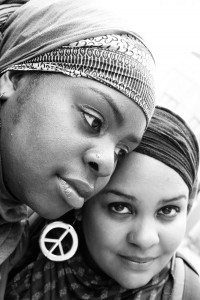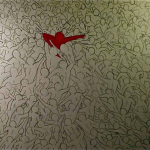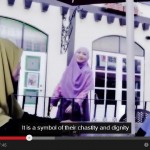A few weeks ago, I had the opportunity to catch up with director of the documentary film “Hip Hop Hijabis,” Mette Reitzel, who followed the lives of UK-based hip hop duo, Poetic Pilgrimage.
Poetic Pilgrimage consists of two Muslim convert women, Tanya Muneera Williams and Sukina Owen-Douglas, who have shaken the U.K hip hop scene. Combining their rapping and singing skills, these two women manage to beautifully intertwine their faith with their Jamaican culture and love for hip hop. To these women, there exists no contradiction in their faith and their journey as musicians.
I managed to ask Muneera some questions through email about her thoughts on the upcoming documentary, her relationship with Sukina, some challenges within the hip hop scene, and intertwining culture with Islam.
Sharrae: How did you and Sukina first meet?
Muneera: Sukina and I attend the same secondary school. I was couple of years older than Sukina, but we still spoke and were friendly. We became friends after the both of us joined the school gospel choir. This is where our friendship started but it developed when we both got involved with a talent show that was for young black people in our hometown. Prior to the night of the talent show, there were several workshops, encouraging a sense of camaraderie amongst the people involved. It worked, because soon we found ourselves socialising outside of the realms of the show.
When did you and Sukina realize you had artistic chemistry?
I can’t say when the moment was. What I can tell you is that I heard Sukina sing, and Sukina heard me rap. That was supposed be the basis of our group coming together. Even then my rapping was more poetic rather than anything else. I don’t think we even thought about how we would sound together. We just knew that we had found solace in our friendship, so if we were going to do something musical, it would be together. I think in the early days we didn’t really even think about our energy together, we just knew that as individuals we were good so there would be no reason we would not be good as a duo. Although strange, I think this was a good thing, because we spent more time nurturing our friendship before anything, and now what is evident about us on stage as a group, is that we have a spark together, the type of spark that is only there when you know and love someone.

Music plays a big part in Jamaican culture, yet is seen as taboo in some segments of the Muslim community. How do the two of you manage to reconcile the two?
For us this isn’t problematic as we don’t follow the opinion that music is Haram. Being raised with a Caribbean cultural backdrop and being exposed to Jamaican history and of course reggae music, in my opinion this is a perfectly acceptable and even complimentary art form to express messages of God, Love, and social justice. Looking particularly at reggae music, it has always done this. I not sure the type of music people have been exposed to and what people were doing either prior to embracing Islam or practicing Islam. But for us music has always largely been a positive and not a negative and the idea that all music regardless of message and context should be forbidden is preposterous to me.
What was your initial impression of Mette and your decision to place your trust in her?
First impression was hmmm another film maker let’s see how far this one goes, but if she wants to take us out for tea and cake who am I to stand in her way. When she started to film and came to us with schedule, being the ignorant girl that I can be at times, I was like oh she’s Danish, I bet she really wants to portray us in negative light. After a while we grew used to her and realised she had no negative intent. But we still weren’t that compliant, because Sukina and I are both quite free spirited and the idea of having to tell someone where we would be and what we would be doing at different times was hard to get used to. Really it’s only when Mette showed us the first trailer that we started to see the vision. Even now I know it must be hard for Mette because at times Sukina and I are in a different land of non-communication outside of ourselves.
What was it like having your life documented for 3 years?
I guess Mette would be the best person to ask that question to, because she is the one who has remained patient during our moods and whims. Sometimes it was fine, while other times it was frustrating having big cameras in our faces. At no point did I think we compromised by acting our best for the camera, in fact quite the contrary, for the most part, Sukina and I were so honest we became concerned about being too honest and taken out of context. But having spent so much time together I can truthful say I think Mette gets us now, and we get her, so we work well together.
What are some of the challenges you’ve had in the Hip Hop scene? Has there been a level of patriarchy within the community?
We are living in a patriarchy world and Hip Hop is obviously very male dominated, however our experience in the hip hop world has not been a negative one. Maybe it is what we chose to expose ourselves to, or maybe the UK scene is just different than the scene elsewhere. I’ve never felt the urge to wear a mini or to put on a pair of baggy jeans unless I wanted to. For the most part outside of the Muslim community, it’s not that complicated. People who like you support you, those who don’t, don’t support; that suits us fine. Also we occupy spaces outside of the realm of hip hop, and diversity is great.
Does the film explore the experience of anti-Black racism within the Muslim community?
We don’t aim to tackle that, and I have not seen enough of the footage to see if it does, but I would think in some mild way there may be hints leading towards that, and if not racism certainly notions of cultural interpretations of Islam.












